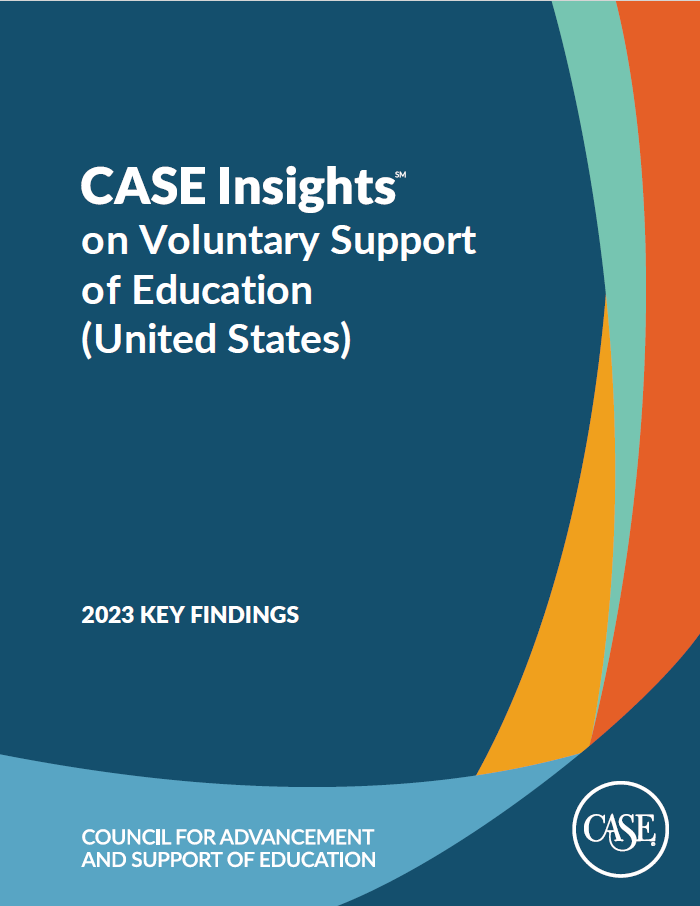
Giving to U.S. College and Universities at $58 Billion in Fiscal Year 2023
WASHINGTON, D.C. — Giving to U.S. higher education institutions was $58 billion in the fiscal year ending June 30, 2023. Although this represents a 2.5 percent decline from the record high reported in 2022, it demonstrates continued significant philanthropic support to the important higher education sector. The annual survey results were released today by the Council for Advancement and Support of Education in a research brief.
The CASE Insights on Voluntary Support of Education survey is the definitive source of data about philanthropic support for nonprofit and public higher education institutions in the United States. Now in its 50th year of supporting advancement professionals, CASE recognizes the importance of understanding the level of philanthropic support for higher education institutions and the difference such support makes to recipient institutions and the many thousands of lives touched by them.
“The philanthropic investment of over $58 billion in higher education institutions in the United States last year should be a source of celebration and pride,” says Sue Cunningham, President and CEO of CASE.
“That so many individuals and organizations support colleges and universities indicates nationwide recognition of the immense value these institutions provide through transforming lives and society. Recent headlines too frequently cast a negative light on the value of institutions of higher education. However, the trust demonstrated by this level of philanthropy tells a different story. Kudos to the many who choose to give and to those working in institutions that educate future generations and undertake research to save and improve lives,” Cunningham adds.
In 2023, 757 institutions participated in the VSE survey. Those institutions reported that gifts from organizations rose. In contemporary philanthropy, organizations are the primary sources of support for U.S. colleges and universities, accounting for 64.7 percent of the funds reported on the survey. Among the organizations that contribute are foundations (including family foundations), corporations (including privately held companies), donor-advised funds, and a range of other organizations. Giving from individuals declined. Gifts for capital purposes, which support the physical and economic infrastructure of institutions, declined. Among survey respondents, gifts to unrestricted endowments and those funding newly established irrevocable deferred gifts increased, but together these categories represent less than 3 percent of total support among responding institutions.
“As illustrated in the accompanying research brief, viewed over a five-year period, the level of support is high despite a decline in this single year,” says Ann E. Kaplan, Senior Director of the CASE Voluntary Support of Education survey. “The stock market was weak in December 2022, and many donors time their charitable gifts to coincide with stock market growth periods. Some organizational donors base gift and grant levels on the previous year’s economy, making commitments a year or more in advance. This partly explains why the level of support from organizations rose when personal giving declined.”
“The data we collect on CASE Insights surveys allow each institution to understand trends in its own performance over time and to benchmark with like institutions,” says Cara Giacomini, Vice President of Data, Research, and Technology at CASE. “National data give us an overview of what occurred in the aggregate, but each institution has a unique set of relevant metrics.”
The number of gifts totaling $100 million or more was higher than in 2022. There were 11 gifts of such magnitude in 2023, accounting for 3.9 percent of total support. That is more than double these gifts’ weight in 2022, when seven such contributions accounted for 1.8 percent of the total.
Large gifts predominantly, though not exclusively, fund endowments. Much of this endowed support is targeted by donors to fund student financial aid, academic divisions, and faculty and staff compensation. In contrast, smaller outright gifts tend to be restricted to current operations, with the largest percentage earmarked for research. Both types of support are of great value to institutions, though gifts to endowments arguably redistribute income to a greater extent than do contributions to annual funds.
A detailed brief on the findings can be found here. The 2023 annual publication will be available in April at the same link.

CASE Insights on Voluntary Support of Education
About CASE
CASE—the Council for Advancement and Support of Education—is a global, not-for-profit membership association with a vision to advance education to transform lives and society.
CASE is the home for advancement professionals, inspiring, challenging, and equipping them to act effectively and with integrity to champion the success of their institutions. CASE defines the competencies and standards for the profession of advancement, leading, and championing their dissemination and application with more than 97,000 advancement professionals at 3,100 member institutions in 80 countries.
Broad and growing communities of professionals gather under the global CASE umbrella. Currently these include alumni relations, development services, communications, fundraising, government relations, and marketing. These professionals are at all stages of their careers and may be working in universities, schools, colleges, cultural institutions, or other not-for-profits. CASE uses the intellectual capital and professional talents of a community of international volunteers to advance its work, and its membership includes many educational partners who work closely with the educational sector.
Headquartered in Washington, D.C., CASE works across all continents from its regional offices in London, Singapore, and Mexico City to achieve a seamless experience for all its stakeholders, particularly its members, volunteers, and staff.







